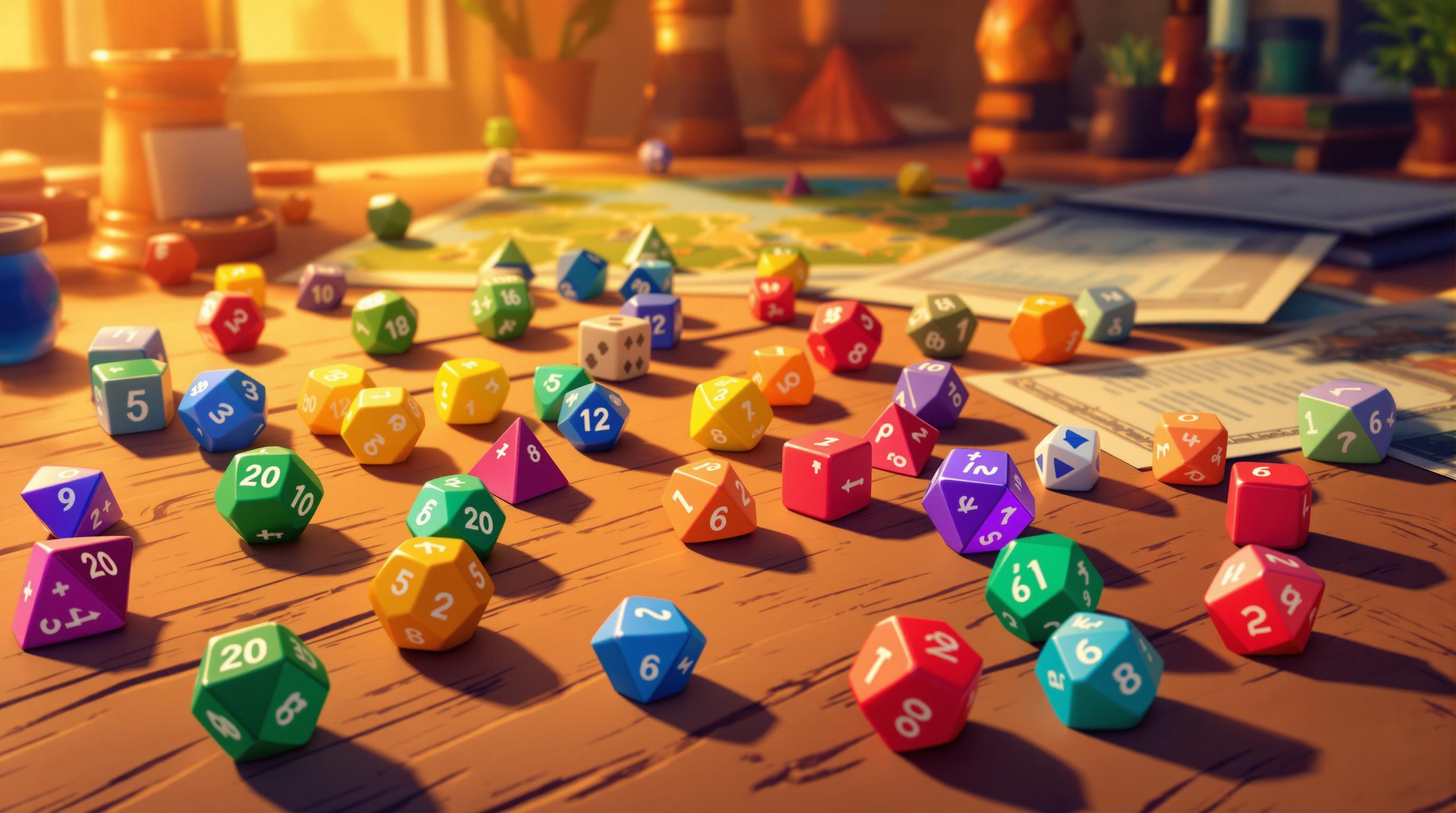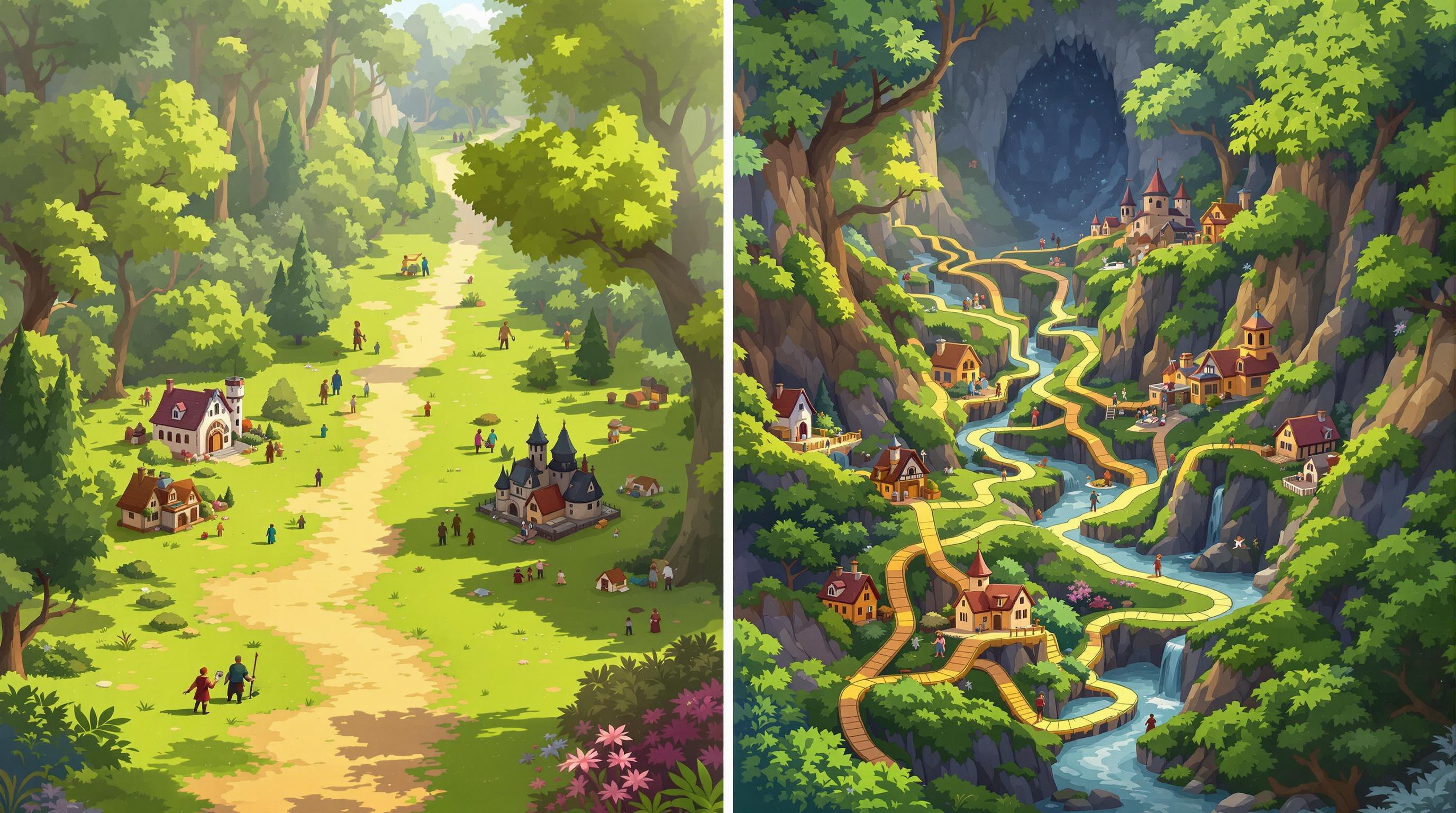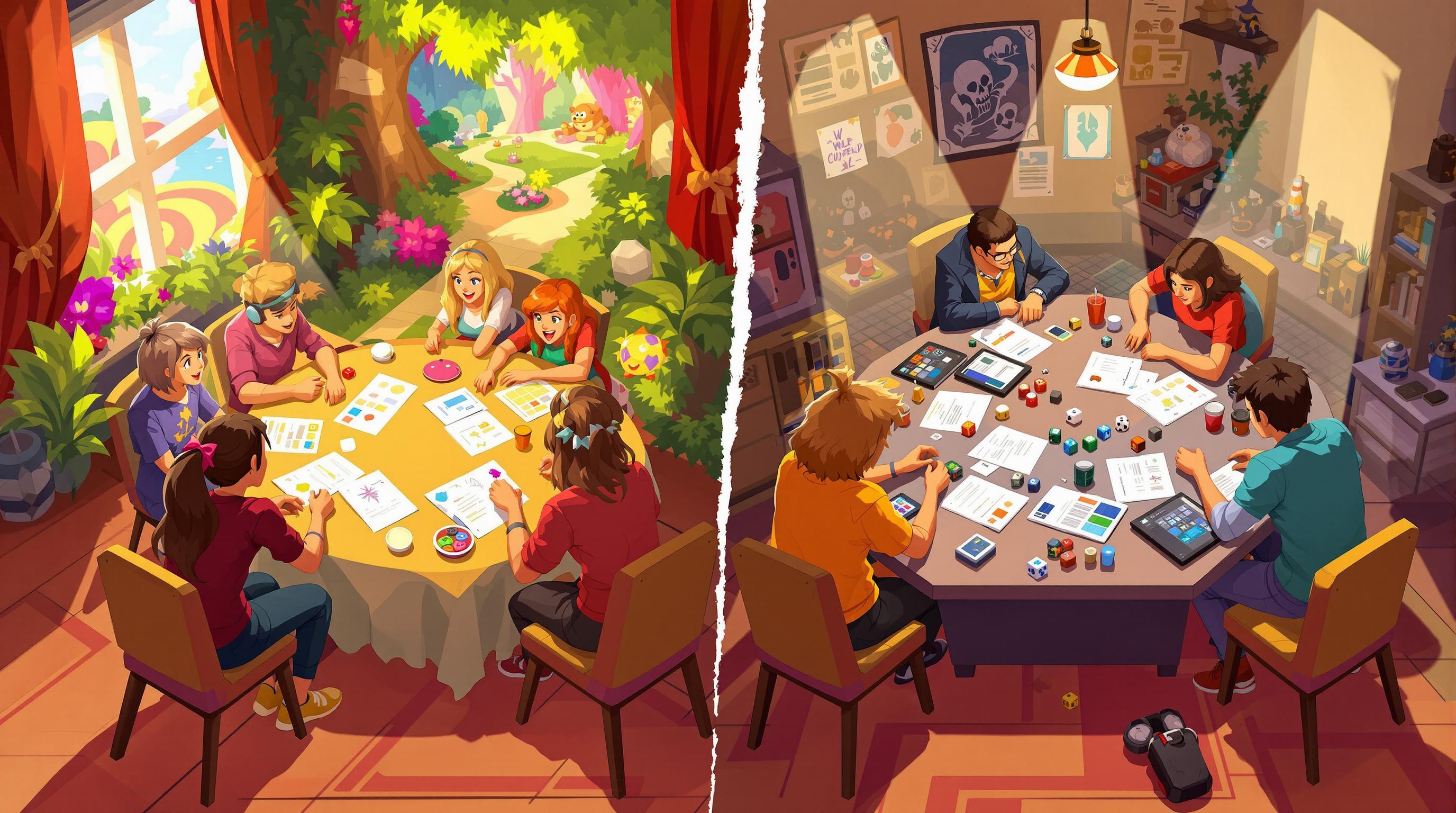Looking for a cosmic tabletop roleplaying experience? Here are 10 sci-fi TTRPGs that will blast you into space:
- Stars Without Number
- Starfinder
- Traveller
- Scum and Villainy
- Star Trek Adventures
- Coriolis
- Dune: Adventures in the Imperium
- Eclipse Phase
- Mothership
- Blue Planet: Recontact
These games offer a range of experiences from gritty space westerns to diplomatic missions among the stars. Whether you want to explore alien worlds, engage in interstellar trade, or survive cosmic horrors, there's a game here for every space fan.
Quick Comparison:
| Game | Setting | Complexity | Key Features |
|---|---|---|---|
| Stars Without Number | Sandbox sci-fi | Medium | Flexible, great GM tools |
| Starfinder | Fantasy-sci-fi hybrid | High | 107 playable races, starship combat |
| Traveller | Hard sci-fi | Medium | Character creation minigame |
| Scum and Villainy | Space outlaws | Low | Narrative-focused, flashback mechanic |
| Star Trek Adventures | Star Trek universe | Medium | True to source material, diverse aliens |
| Coriolis | Arabian Nights in space | Medium | Unique setting, ship customization |
| Dune | Dune universe | High | Political intrigue, multiple eras |
| Eclipse Phase | Transhumanist sci-fi | Very High | Mind uploading, body switching |
| Mothership | Sci-fi horror | Low | Deadly, stress system |
| Blue Planet | Aquatic sci-fi | High | Detailed alien ecology, genetically modified dolphins |
Ready to launch your next cosmic adventure? Grab a rulebook and blast off!
Related video from YouTube
Stars Without Number

Ever dreamed of exploring a fallen galactic empire? That's exactly what Stars Without Number: Revised Edition offers. This sci-fi TTRPG, brainchild of Kevin Crawford, mixes old-school vibes with modern game design.
Think of it as D&D meets Traveller, but with its own unique twist.
What makes this game special? First off, it's super flexible. Want a gritty space western? Or maybe an epic space opera? Stars Without Number has you covered. The game's setting is a blank canvas, ready for you to paint your sci-fi masterpiece.
But here's the real kicker: the tools. This game is packed with goodies for GMs. From creating entire sectors to managing factions, you've got everything you need to build a living, breathing universe.
As Chris P Wolf, a well-known RPG reviewer, puts it:
"Stars Without Number is really an incredible achievement for a single designer, and I can't overstate that enough."
Let's talk characters. The game gives you three core classes, but that's just the beginning. The revised edition adds special talents and character foci, letting you create truly one-of-a-kind space adventurers.
And if you're into mind powers, you're in luck. The psionics system is detailed and fits perfectly into the game's lore.
But here's the best part: it's accessible. The core rulebook is free as a PDF. If you love it (and you probably will), there's a paid version with even more content, including rules for mechs and transhuman games.
For GMs, this game is a treasure trove. It's packed with tools to turn your ideas into full-fledged adventures. Need to create NPCs or alien creatures on the spot? The random tables have your back.
Stars Without Number isn't just a game. It's a toolkit for crafting unforgettable sci-fi adventures. Whether you're a veteran space explorer or a rookie pilot, this game opens up a universe of possibilities. So grab your blaster, fire up your starship, and set course for adventure!
2. Starfinder

Picture Pathfinder, but with a space twist. That's Starfinder in a nutshell. This sci-fi RPG from Paizo takes you on a wild ride through a universe where magic meets tech.
Set in a far-flung future after Pathfinder, Starfinder introduces the 'Gap' - a mysterious period of galaxy-wide memory loss. This clever setup lets new players jump right in without needing a history lesson.
What makes Starfinder pop? For one, it's got a mind-boggling 107 playable races. From androids to four-armed Kasathas, you're spoiled for choice. And yes, your favorite fantasy races have made the leap to space too.
The game brings seven new classes to the table:
- Envoys: Smooth-talking diplomats
- Mechanics: Tech wizards with AI sidekicks
- Mystics: Spellcasters with a sci-fi flavor
- Operatives: Stealthy spies
- Soldiers: Classic space marines
- Technomancers: Magic-tech hybrids
- Solarians: Masters of stellar energy
Starfinder's character creation is where it really shines. You don't just pick a race and class - you also choose a theme. This adds depth to your character and throws in some cool perks.
"Starfinder does a fantastic job of translating Pathfinder's gameplay to a sci-fi setting, refining the classic d20 RPG mechanics while introducing smart additions that fit with the game's greater scope." - Matt Jarvis, Tabletop Gaming
One of the coolest features? Starship combat. You and your crew can zip around in your own customizable spaceship, each taking on different roles during battles. It's like Star Trek crashed into D&D!
The game uses a d20 system, so if you know D&D or Pathfinder, you'll catch on quick. But Starfinder has streamlined some rules to keep things moving. For example, there are only three actions that provoke attacks of opportunity: moving out of a threatened square, making a ranged attack, and casting a spell.
Starfinder also brings some fresh mechanics to the table:
- Three-pool system: Characters have Hit Points, Stamina Points, and Resolve Points. This adds a new layer of strategy to combat and recovery.
- Dual Armor Class: You've got Energy Armor Class (EAC) and Kinetic Armor Class (KAC), depending on the type of attack.
- Simplified magic: All spellcasting classes tap into the same magical energy, making it easier to grasp and use.
While Starfinder is less complex than Pathfinder, it's still got a learning curve. Eric Mona, Publisher of Paizo, rates its complexity as a six out of ten, with Pathfinder being a ten. So if you're new to TTRPGs, you might want to cut your teeth on something simpler first.
Ready to blast off? Grab the core rulebook and the first alien archive to get started. And if you're feeling lost in space, don't sweat it - there are pre-made Adventure Paths that give you complete stories with all the trimmings.
Starfinder isn't just a game - it's your ticket to endless cosmic adventures. So suit up, check your blaster, and prepare for launch. The stars are calling!
3. Traveller
Imagine a universe where your character's backstory is as wild as space itself. That's Traveller - a sci-fi TTRPG that's been blowing minds since the 70s.
Traveller's not your average "start as a newbie" game. Nope. You might end up playing a battle-hardened space vet right off the bat. As game reviewer Dom Mooney puts it:
"Overall, I recommend this new edition wholeheartedly."
The latest Mongoose Traveller edition? It's got some cool upgrades:
- 240 full-color pages (that's 20% more than before)
- Better layout and art
- Smoother rules that still work with older versions
Creating a character in Traveller? It's like a game before the game. You roll for six traits: Strength, Dexterity, Endurance, Intellect, Education, and Social Standing. Then pick from twelve careers. Want to be an Agent? A Merchant? Maybe a Scout?
Here's a tip: Make characters as a group. Use the Connections Rule to link your characters and grab some extra skills. It's a great way to build your crew before you even hit the stars.
New to the game? The character creation flowchart is a lifesaver. It makes the whole process way easier to follow. Plus, skill levels max out at 4 during creation, so nobody starts off as a space superhero.
Traveller's universe is HUGE. Tons of aliens, planets, and adventures to discover. Into space battles? Interstellar trade? Smooth-talking your way through diplomatic missions? There's something for everyone.
Want to give it a shot? Grab the Traveller Explorer's Edition PDF for just $1 from the Mongoose Store. Pair it with Seth Skorkowsky's free "Death Station" adventure from DriveThruRPG, and you're all set to start your cosmic journey.
4. Scum and Villainy

Want to be a space outlaw? Scum and Villainy is your ticket to the stars. This sci-fi RPG from Evil Hat Productions drops you into the Procyon Sector, where smugglers, rebels, and bounty hunters fight to survive.
Think Firefly meets Star Wars, with a Cowboy Bebop twist. You're not out to save the galaxy - you just want to make a buck and maybe hit the jackpot.
What makes this game special? It's all about the ship. You and your crew pick one of three:
- Stardancer: For smugglers and transporters. Like Serenity from Firefly.
- Cerberus: For bounty hunters and mercenaries.
- Firedrake: For rebels fighting the Hegemonic Alliance.
Your ship isn't just transportation - it's a character that grows with your crew, gaining new tricks as you play.
The game uses the Forged in the Dark system, which puts story first. As game reviewer Josh Walles says:
"Scum and Villainy is a narrative-first style of game."
This means less math, more storytelling. Describe what you do, then roll the dice to see what happens.
One cool feature? Flashbacks. Forgot something important? No sweat. Use a flashback to show how you prepared earlier. It's like Ocean's Eleven in space!
Making characters is easy. Pick from types like Mechanic, Mystic, or Scoundrel. Each has special skills to help you survive in space.
Scum and Villainy works best as a campaign. It's made for about 12-20 sessions, giving you time to build your crew from nobodies to sector legends.
Want to start? The rulebook is 360 pages, but don't worry. The creators say you can play after reading just the first 52 pages. The rest is there when you need it.
So, get your crew, pick your ship, and blast off. In Scum and Villainy, the galaxy's yours for the taking.
5. Star Trek Adventures

Star Trek Adventures lets you boldly go where no tabletop RPG has gone before. Released in 2017 by Modiphius, this game brings the iconic TV series to your gaming table.
Using a unique 2d20 system, Star Trek Adventures captures the essence of Trek. It's not just about space battles - the game focuses on diplomacy, exploration, and scientific discovery.
What sets it apart?
- True to Trek: The game feels like a Star Trek episode. You'll solve problems with futuristic science, not just phasers.
- Diverse Characters: Play as Andorians, Bajorans, Betazoids, and more. The Lifepath system creates backstories that fit right into the Trek universe.
- Team Spirit: "Momentum" is a shared resource that boosts actions. It encourages the teamwork we love in Star Trek.
- Engaging Ship Combat: Everyone has a role in starship battles. It's not just number crunching - your actions matter.
- Tons of Support: The game offers resources for different Trek eras and campaigns. No more Klingon-heavy supplements!
But be warned: at 368 pages, the rulebook is as dense as a neutron star. Players should know the rules to keep the game moving at warp speed.
"Between its approachability and its versatility, 'Star Trek Adventures' won me over in a big way." - Marshall Honorof, Senior Editor for Tom's Guide
Want to beam aboard? Modiphius offers free quick-start rules. Try before you buy the $59 core rulebook.
sbb-itb-b8b00a5
6. Coriolis

Picture this: "Arabian Nights in space." That's Coriolis: The Third Horizon in a nutshell. This sci-fi RPG from Free League drops you into a distant star cluster packed with ancient portals, proud civilizations, and dark secrets.
Coriolis is set in the Aldebaran star system, over 1,000 years from now. It's a far cry from your typical sci-fi backdrop. The game's Third Horizon setting, inspired by Middle Eastern culture, spans about 30 star systems cut off from other inhabited parts of space.
What makes Coriolis tick?
For starters, it's got a setting that's off the beaten path. You've got mysticism rubbing shoulders with high-tech gadgets and political intrigue. One minute you're poking around in ancient ruins, the next you're knee-deep in a political plot or facing off against some cosmic horror.
Character creation? You've got options. Want to be an Artist? A Data Spider? Maybe a Fugitive or even a Preacher? Take your pick. Every character has four key attributes: Strength, Agility, Wits, and Empathy. These shape your skills and abilities.
Gameplay is smooth as silk. Coriolis uses the Year Zero Engine, which is all about keeping things simple and story-focused. Don't take my word for it. Here's what one RPGnet reviewer had to say:
"Coriolis just strikes me as smooth, I grokked the mechanics in one read-through, and the setting and mood of Coriolis just comes through while reading the rule book."
But wait, there's more. Coriolis puts a big emphasis on spaceships. You get to build and crew your own vessel, which isn't just your home base - it's practically a character in its own right. There's a whole chapter dedicated to spaceship creation and customization.
And then there's the "praying to Icons" system. It's a neat little mechanic where players can get re-rolls on failed actions. But there's a catch - it generates Darkness Points for the GM. It's a classic risk vs. reward scenario.
Coriolis has turned some heads in the RPG world. It snagged the ENnies Judges' Spotlight in 2017. The core rulebook is a hefty 384-page hardcover that'll set you back about $46 USD.
Want to dip your toes in before diving in? Free League's got you covered with a quickstart guide on DriveThru RPG. It's got streamlined rules, pre-made characters, and a sample adventure called "Dark Flowers."
If you're into space exploration, factional scheming, or mixing spirituality with sci-fi tech, Coriolis might be right up your alley. Here's another enthusiastic take from an RPGnet reviewer:
"This is a gorgeous game that I can't wait to both GM and play."
So, what are you waiting for? Round up your crew, plot a course through the Third Horizon, and get ready for some truly stellar adventures!
7. Dune: Adventures in the Imperium

Ever wanted to step into Frank Herbert's Dune universe? Now you can with Dune: Adventures in the Imperium, a tabletop RPG from Modiphius Entertainment. This game throws you into a world of political scheming, mystical powers, and high-stakes adventure.
The game uses Modiphius's 2d20 system to bring Dune's complex world to life. It's not just about dice rolls - it's about outsmarting your rivals and surviving in a harsh universe.
What's cool about this game? You're not stuck in one time or place. Want to fight in the Butlerian Jihad? Go for it. Prefer to play during Paul Atreides' rise to power? That's an option too. The game covers several eras:
- The Butlerian Jihad
- The Imperium
- The Ascension of Muad'Dib
- The God Emperor's reign
Creating a character isn't just about building an individual - you're creating an entire House. Your actions don't just affect you; they impact your whole noble family.
"With the sprawling universe that visionary author Frank Herbert created, the stories you can tell in the Dune RPG are not limited to the desert planet of Arrakis." - Mephit James, Author of the Blog
The game offers two levels of play:
1. Agent-level play
You control your character directly, going on missions and getting into personal conflicts.
2. Architect-level play
You command other characters from afar, shaping your House's destiny and influencing the entire Imperium.
This dual approach creates a deep, layered experience that matches the complexity of Herbert's world.
But heads up: this game isn't for casual players. The core rulebook has about 70 pages of essential lore. It's a lot to take in, but if you're up for it, it's worth it.
The game mechanics focus on Skills and Drives, with each character having five of each. This setup makes you think hard about what motivates your character and what they're good at.
For Game Masters, there are tools to handle potentially tricky themes from the original novels. It's a smart way to update the setting while staying true to its core.
The core rulebook costs about $46 USD. It's not cheap, but it's packed with content for hours of gameplay. If you're curious but not ready to buy, Modiphius offers free quickstart rules to try it out.
One reviewer from Dicebreaker said: "Adventures in the Imperium makes it possible to play in something that at least approximates the weirdness of the Dune universe."
Ready to plot your rise to power? Remember: the spice must flow. Dune: Adventures in the Imperium is waiting for you to make your mark on Arrakis and beyond.
8. Eclipse Phase
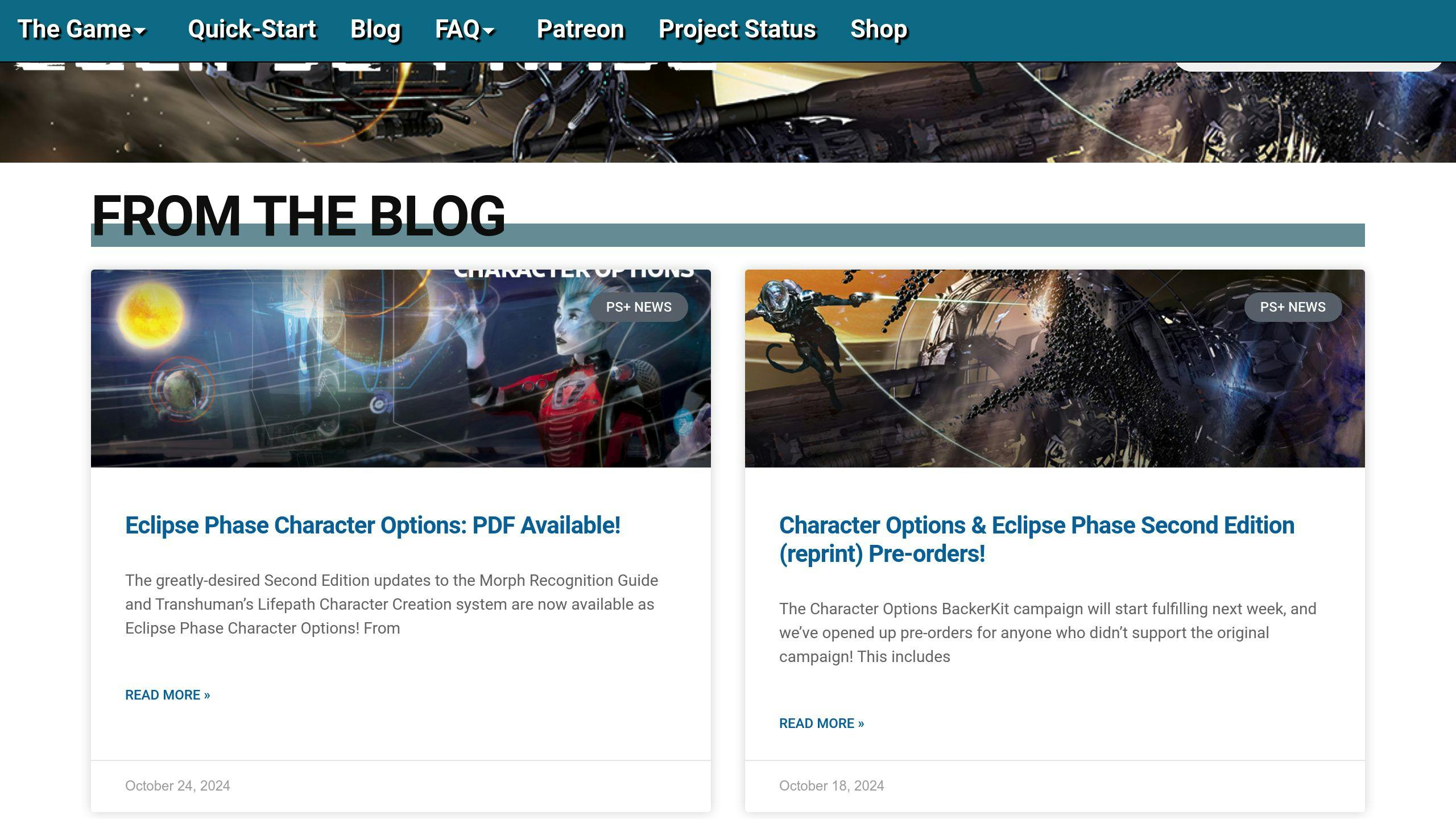
Eclipse Phase takes sci-fi RPGs to a whole new level. Picture this: humanity's scattered across the solar system after Earth got wrecked by rogue AIs. But here's the twist - death isn't game over. You can upload your mind and download into a new body.
One day you're a hulking combat machine, the next you're a swarm of tiny robots. The game's "resleeving" system lets you swap bodies without redoing all your skills. It's wild.
But Eclipse Phase isn't just about cool tech. It digs into big questions about what makes us human. As Cannibal Halfling Gaming puts it:
"Eclipse Phase has one of the best original settings available in the sci-fi RPG world."
You've got three main ways to play:
- Firewall: You're in a secret group protecting humanity from extinction-level threats.
- Gatecrashing: Explore alien worlds through wormholes.
- Guanxi: Dive into the solar system's criminal underworld.
The game uses a d100 system - you want to roll under your skill level. Combat's balanced, tracking both physical and mental damage.
Now, let's be real: Eclipse Phase isn't simple. The core rulebook is 400 pages thick. But the second edition in 2019 made things easier to grasp. It's still a lot, but it's worth it for the deep, immersive sci-fi experience.
Want to try it out? Posthuman Studios offers free quickstart rules with:
- A crash course on the setting
- Basic mechanics
- Four pre-made characters
- An intro adventure called "Acrimony"
Eclipse Phase isn't for everyone. It takes work from players and GMs alike. But if you're after a sci-fi RPG that'll make you think, it's tough to top. One ENWorld reviewer said:
"I don't think I've ever read part of an RPG rule book and set it down to think about the concepts and ideas, or had game-inspired philosophical discussions and debates interspersed throughout character creation."
Ready to explore the edges of space and what it means to be human? Eclipse Phase is waiting. Just remember - your humanity is up for grabs.
9. Mothership

Buckle up, space travelers! Mothership is the sci-fi horror RPG that'll have you jumping at every shadow on your ship. Launched by Tuesday Knight Games in 2018, this game drops you into a universe where staying alive is a constant battle.
Think Alien mixed with Event Horizon, plus a sprinkle of The Thing. Mothership isn't about exploring new worlds - it's about not dying when everything in space wants you dead.
What makes Mothership stand out? First off, it's DEADLY. Your character can bite the dust in seconds, and that's part of the thrill. The game uses a d100 roll-under system with four stats: Strength, Speed, Intellect, and Combat. These are randomly rolled, so you never know what kind of space survivor you'll be.
Pick from four character types:
- Teamsters: Space's working class
- Scientists: The brainy bunch
- Androids: Artificial folks with hidden motives
- Marines: The muscle for when things get ugly
But here's the real kicker: Mothership has a stress system that keeps you on edge. As your character faces space horrors, stress piles up. Too much? You're in for a panic test, which could mean anything from freezing up to attacking your own crew.
Sean McCoy, the game's mastermind, says:
"Mothership is a game that exists at your table, not in a book."
This idea shines in the game's design. The core rules are just 44 pages, but don't be fooled. Mothership delivers a punch with its lean mechanics and focus on creating a nail-biting experience.
Want to try it out? Grab the Player's Survival Guide as a Pay What You Want PDF on DriveThruRPG. The suggested price is $7 - a small fee for the galaxy of terror you're about to face.
10. Blue Planet: Recontact
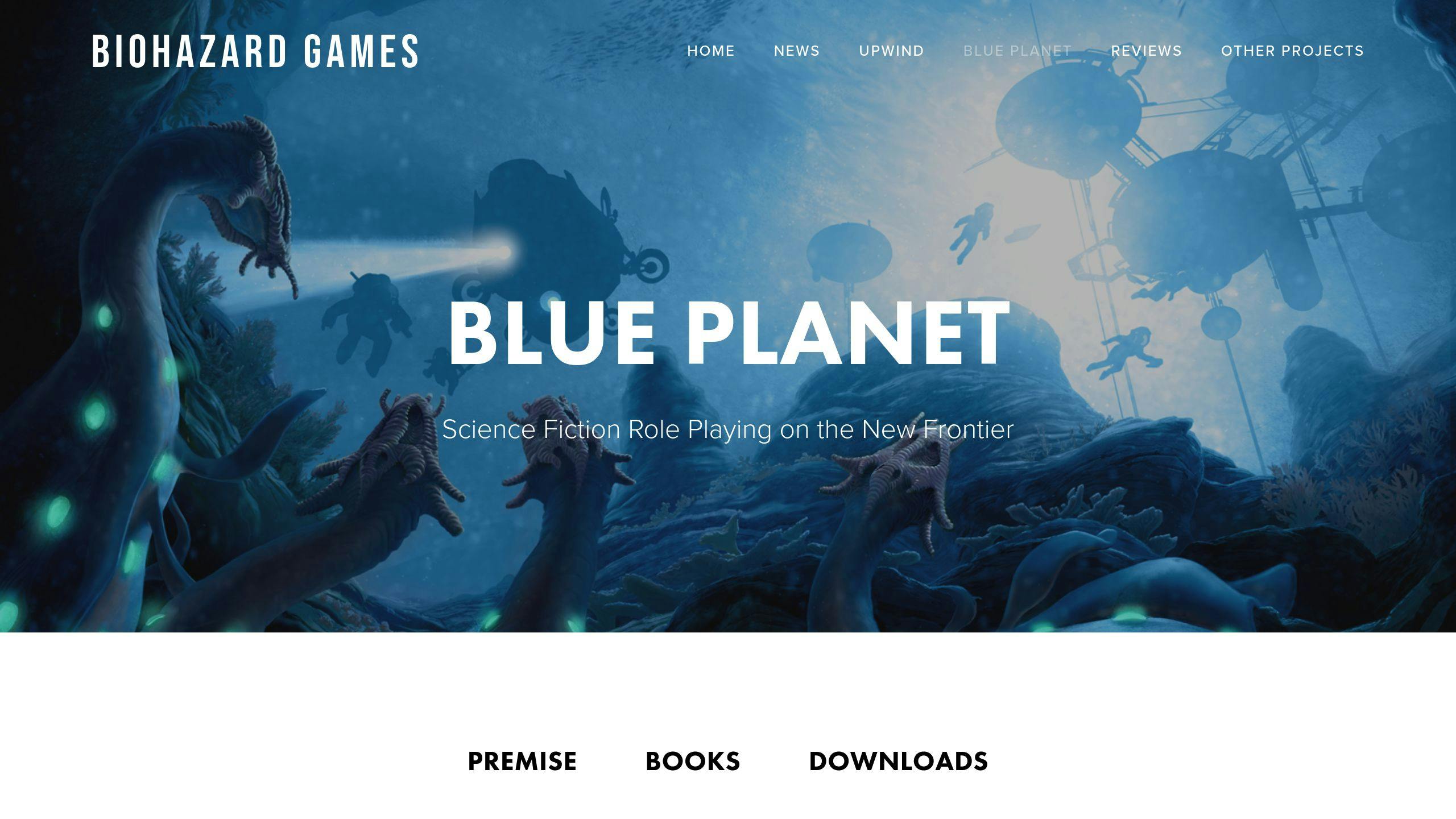
Blue Planet: Recontact is the third edition of a sci-fi RPG that's making a splash in the tabletop world. It's not your typical space adventure - instead of zooming through the stars, you're diving deep into alien oceans.
Set on Poseidon in 2199, this game mixes hard sci-fi with ecological exploration. The creator, Jeff Barber, sums it up nicely:
"Blue Planet is a compelling RPG journey into humanity's precarious future on a distant waterworld where political unrest and a hungry alien ecology threaten the nascent colony effort."
What makes it stand out? For one, the setting is incredibly detailed. The rulebook is nearly 350 pages long, and most of it is dedicated to bringing Poseidon to life. You'll get the lowdown on everything from the planet's weather to its weird and wonderful creatures.
The story's pretty gripping too. Earth's been through the wringer - environmental disaster, a 75-year worldwide famine, the works. So they sent colonists to Poseidon. But after 69 years of radio silence, Earth's back in the picture. Now you've got tension between the old colonists and new arrivals backed by big corporations.
Blue Planet: Recontact doesn't mess around when it comes to science. The game system's been updated to match current tech, scientific, and social ideas. This attention to detail shows up in the gameplay. You might find yourself:
- Keeping the peace as a GEO marshal in the wild frontier
- Navigating dangerous waters in a fighter sub as a mercenary
- Trying to figure out Poseidon's mysterious native life forms
And get this - you can play as genetically modified dolphins with human-level smarts. It's quirks like these that make Blue Planet: Recontact different from your average sci-fi RPG.
But heads up: this game isn't a walk in the park. The combat's quick and deadly, aiming for realism over Hollywood-style action. As one RPGnet reviewer noted:
"Suffice it to say that the aborigines and their secrets turn out to be quite neat, but some of the cool details have been left for future sourcebooks."
If you're into sci-fi games that blend hard science, environmental themes, and political drama, Blue Planet: Recontact might be right up your alley. Just don't get too caught up in Poseidon's depths - they're as addictive as they are dangerous.
Final Thoughts
Sci-fi TTRPGs are like a galaxy of options. From gritty realism to space swashbuckling, there's a game for every space fan.
New to sci-fi TTRPGs? No sweat. Numenera is a great starting point. It's easy to create characters and manage stories - perfect for beginners.
Fan of existing universes? Try Star Trek Adventures. It captures the essence of the show with exploration, moral dilemmas, and crew conflicts.
Want something wild? Check out Eclipse Phase. It's not just about alien worlds. It throws you into ethical debates about mass death, human evolution, and scientific progress. It's a mind-bender with dice.
The key? Know what stories you want to tell. Into survival struggles? Transhuman Space or Dark Heresy might be your thing. Warwick Brown, an RPG fan, says:
"If you are after a gritty world, Transhuman Space is probably the most appropriate as it can be set at any level you want."
Fancy exploring an alien ocean? Blue Planet mixes frontier life, native resistance, and corporate scheming. Kirk Hone, another player, raves:
"I can't recommend Blue Planet V2 highly enough. One of the most well-considered and original game premises and campaign worlds I have ever seen."
Want a mix of depth and ease? Starfinder is often called the "D&D of Science Fiction." It's packed with options but won't drown you in rules.
Whatever game you pick, have fun. Tweak rules if you need to. In space, your imagination's the limit.
So, grab your crew, fire up the engines, and blast off. The stars are waiting. Your next game might spark a galaxy-spanning adventure that you'll remember for light-years to come.
